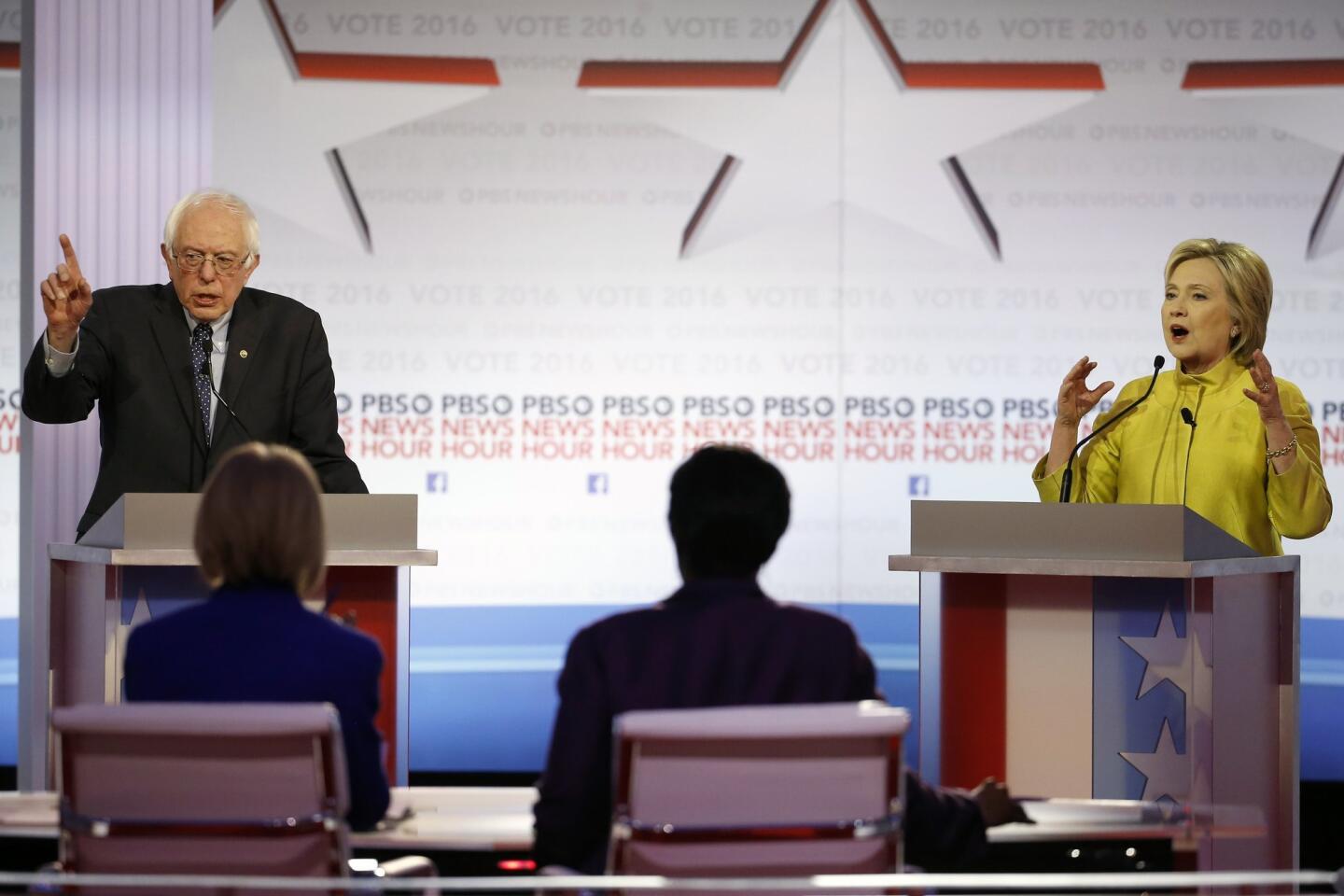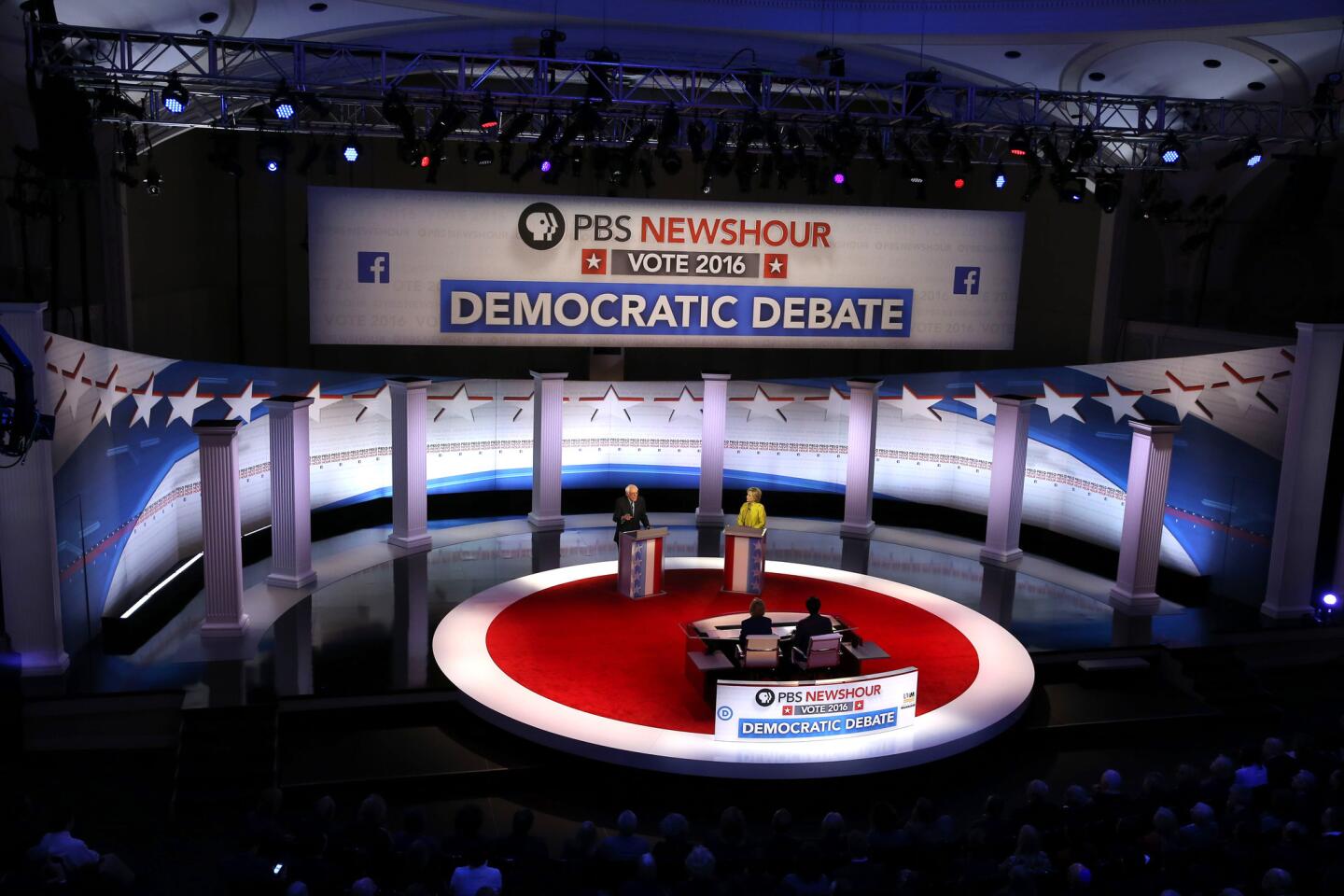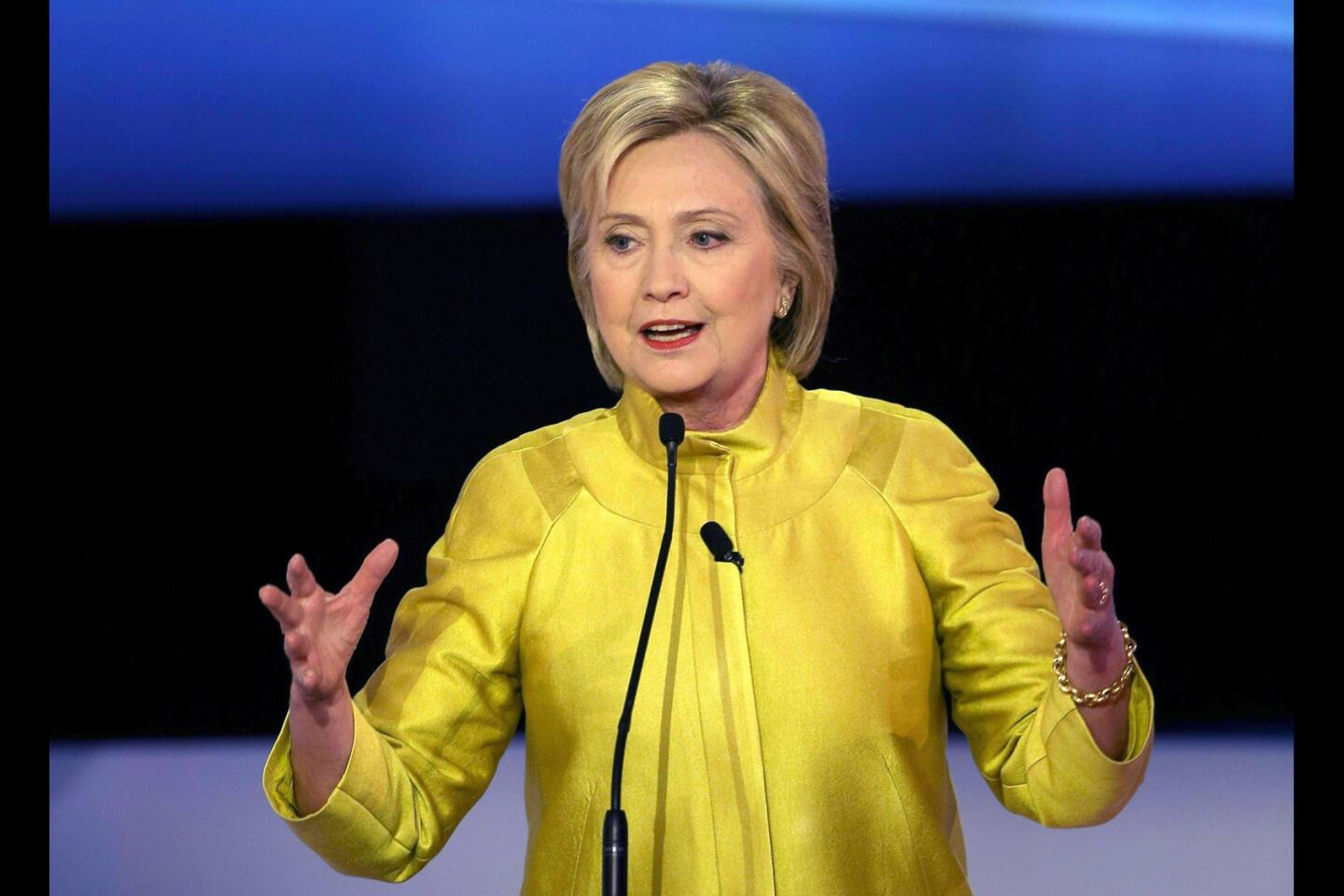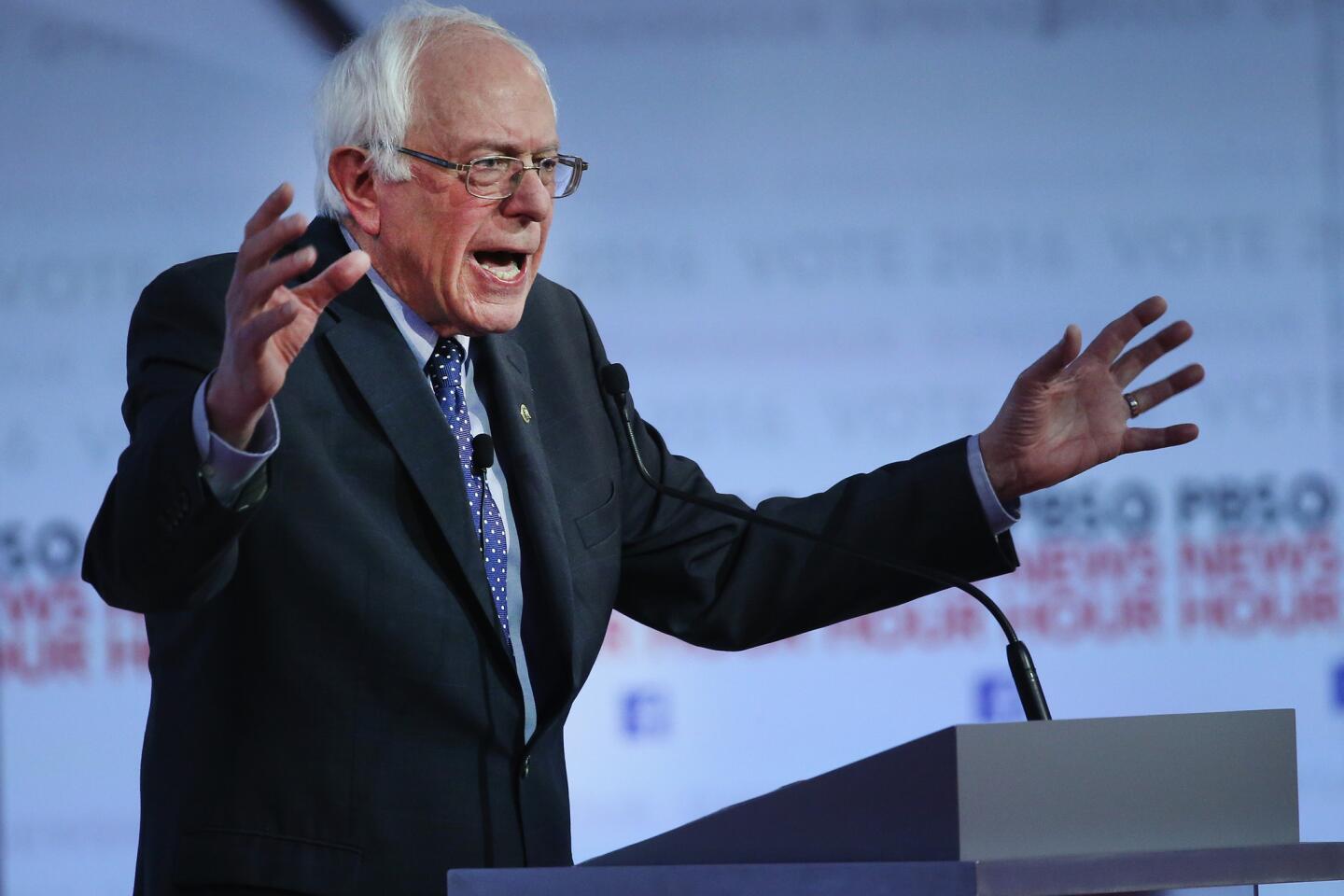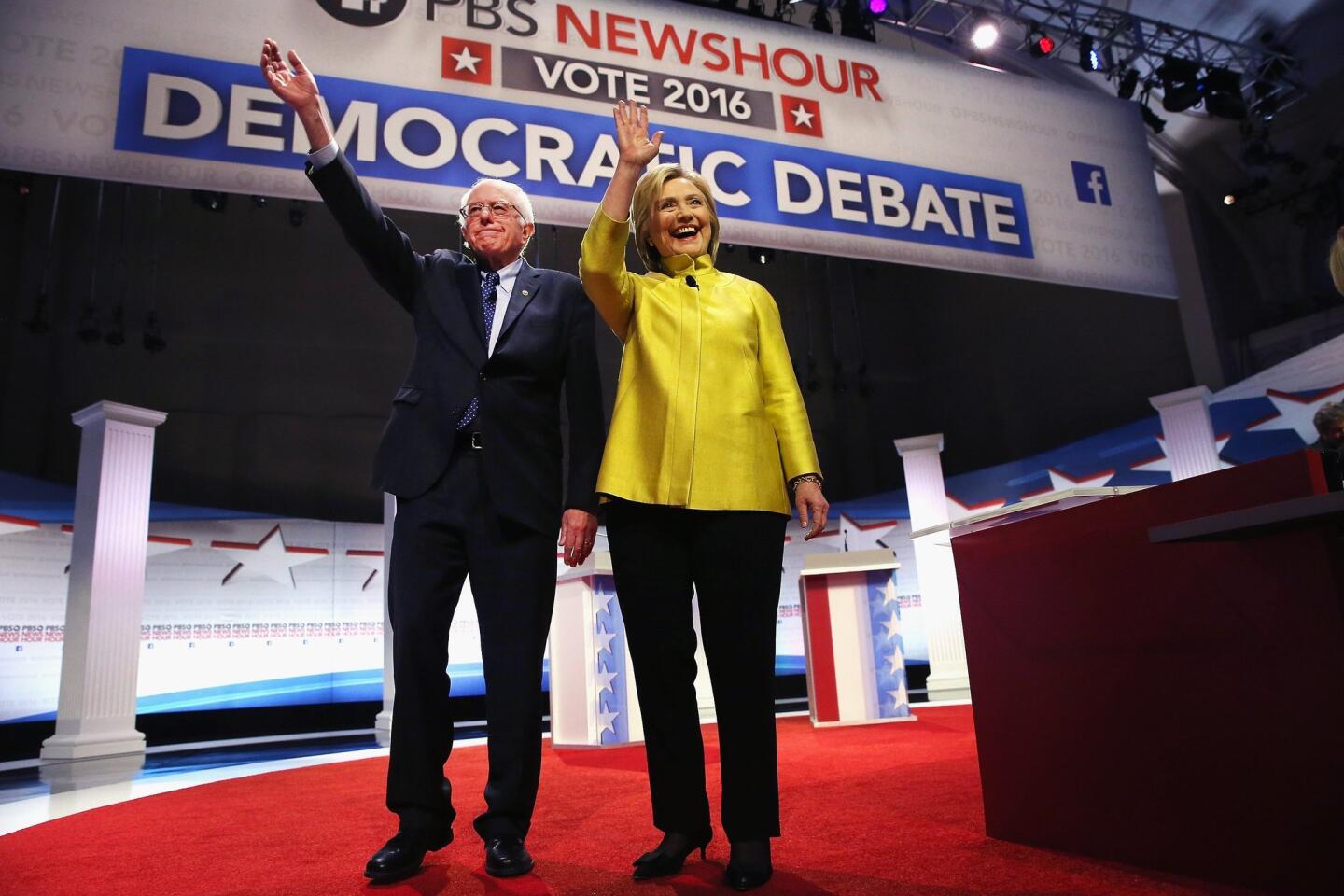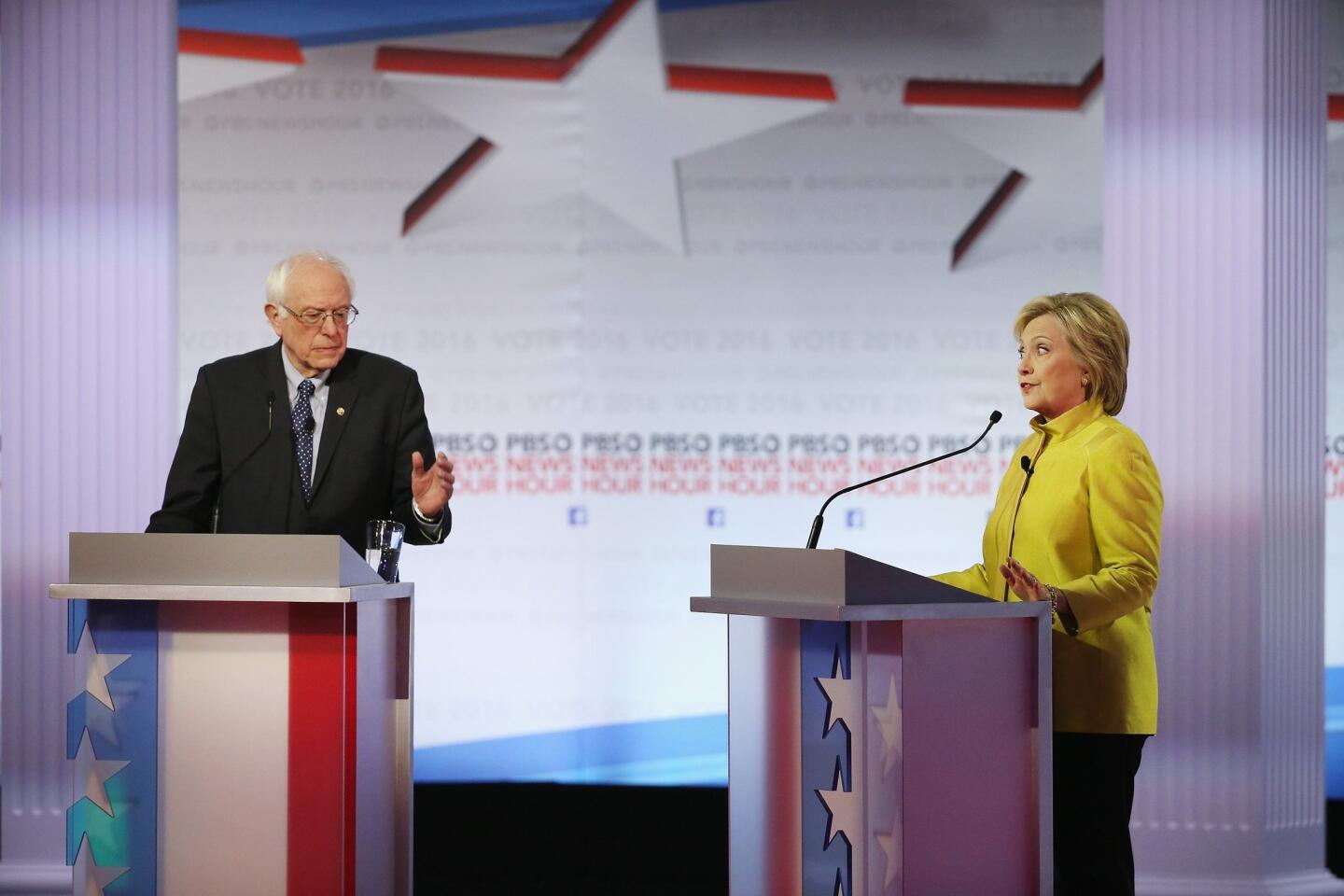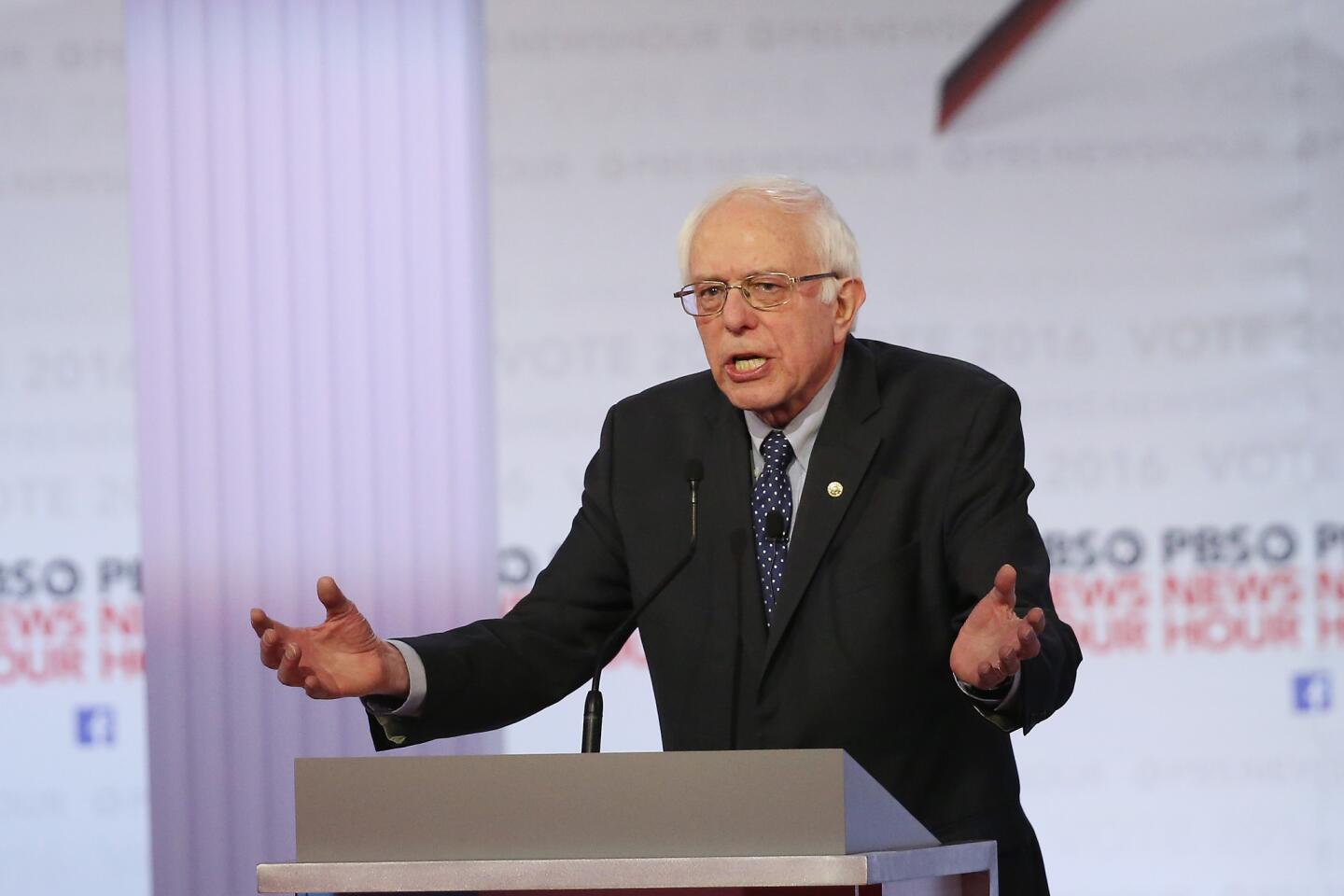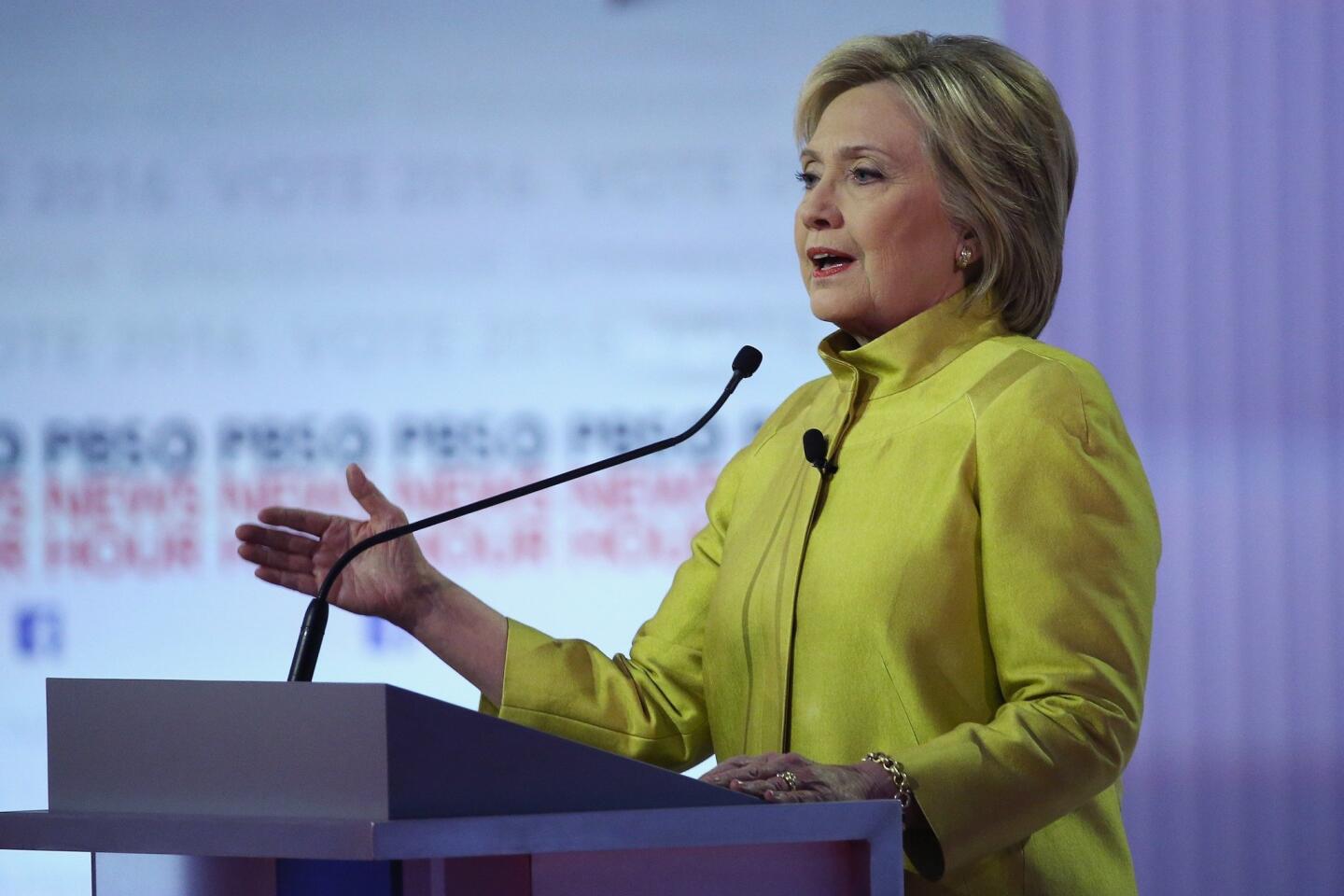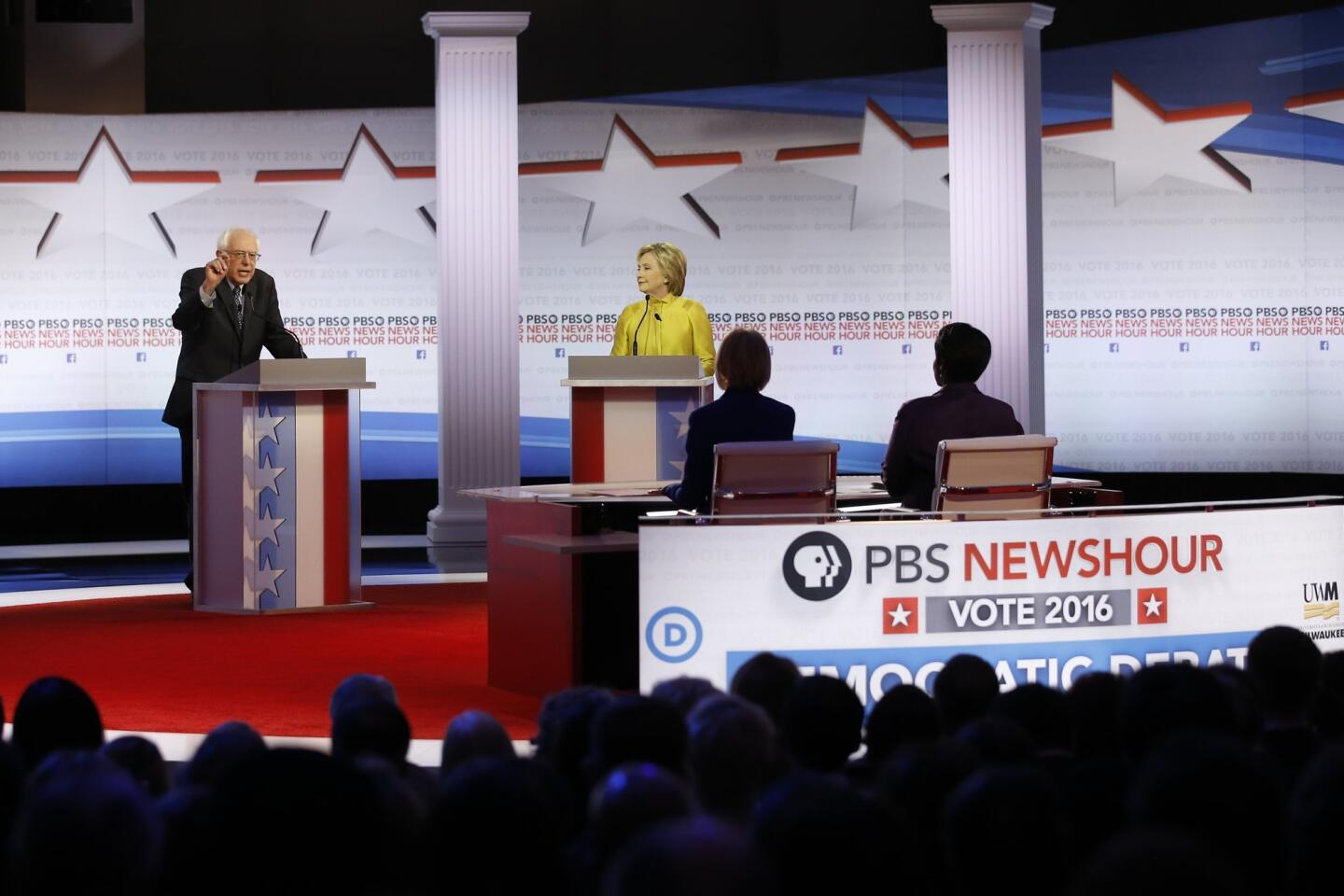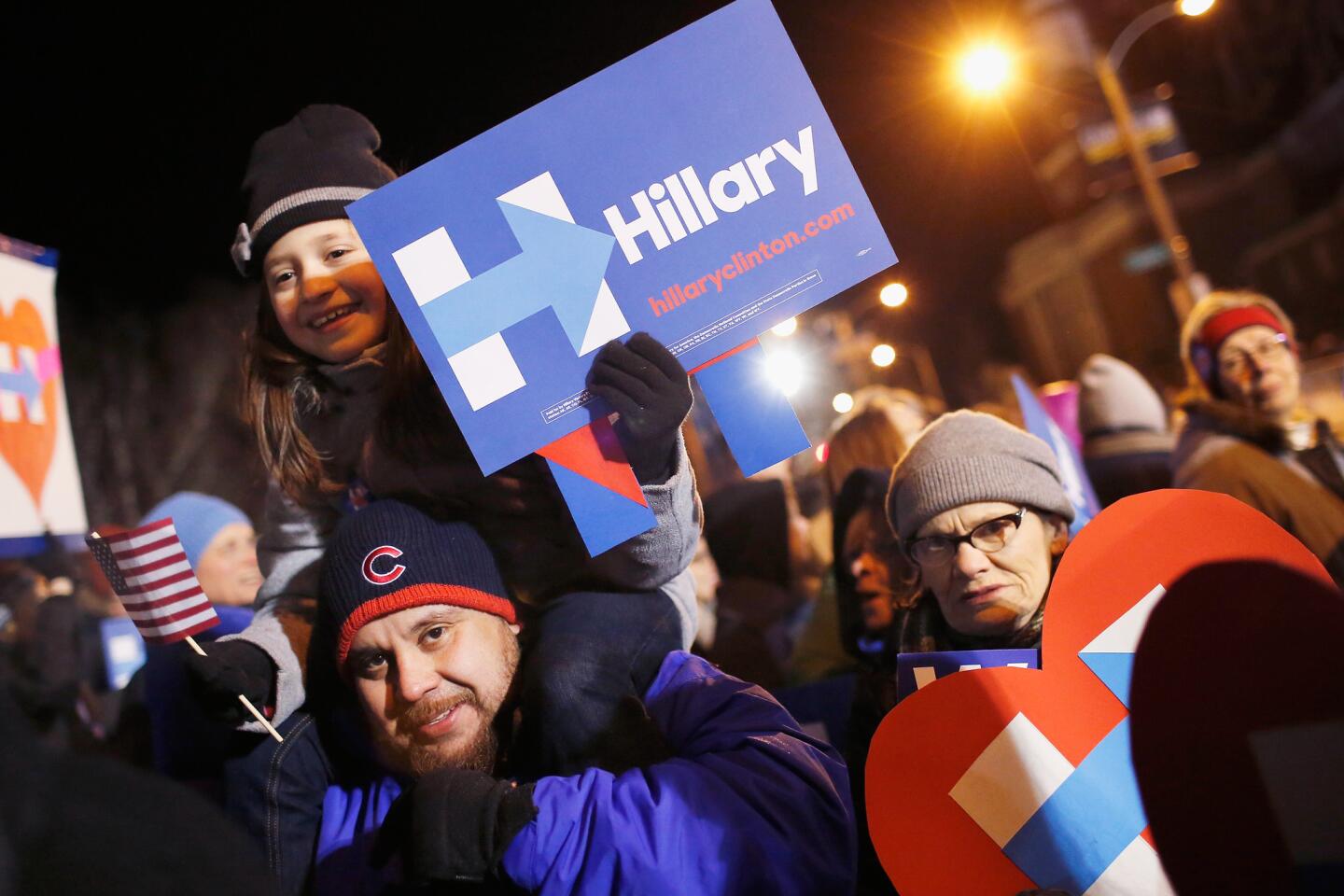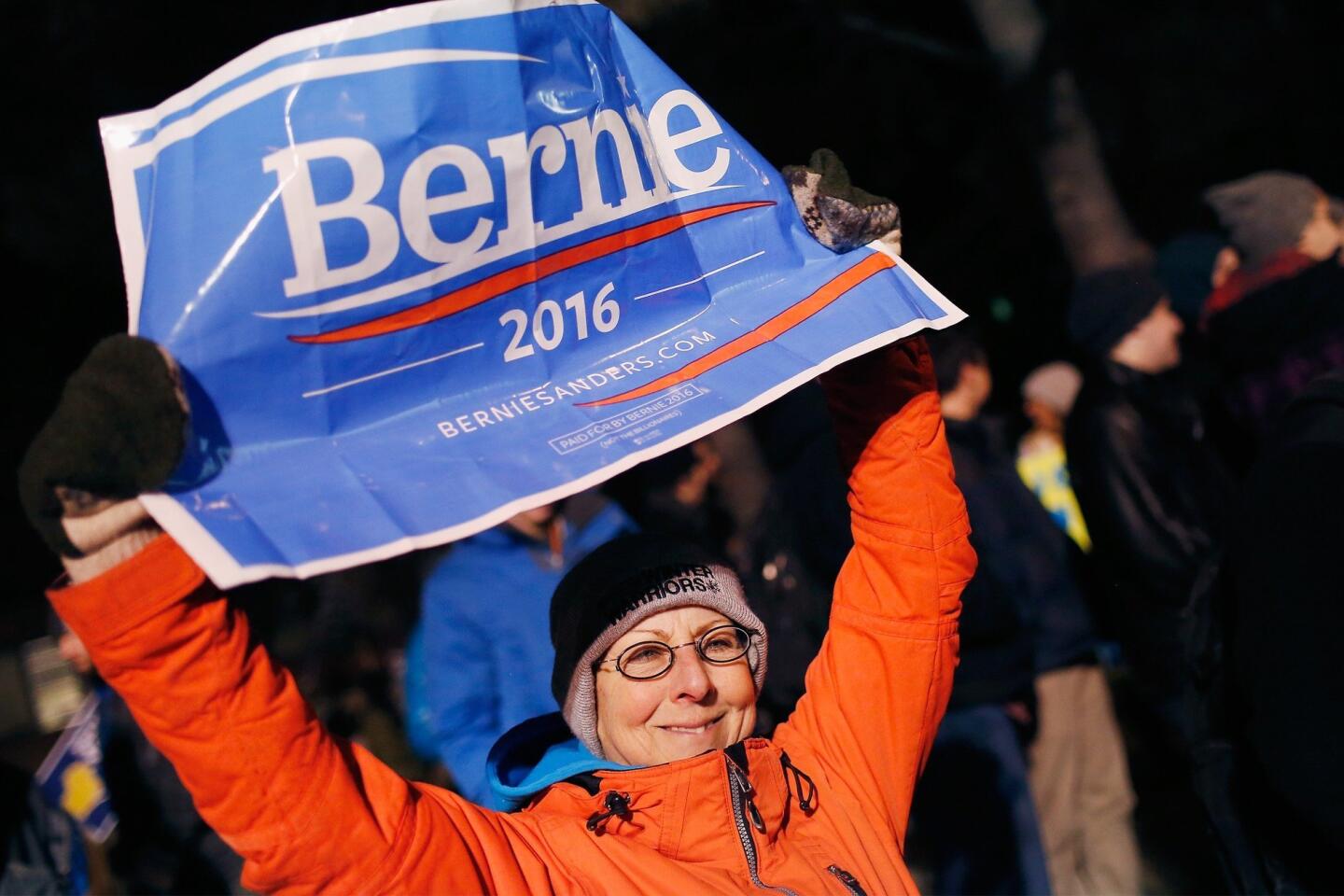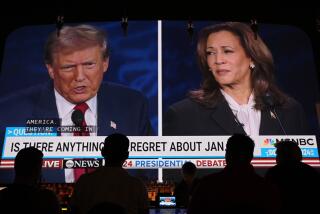Analysis: In debate, a measured Clinton and an invigorated Sanders sharpen their pitches to voters
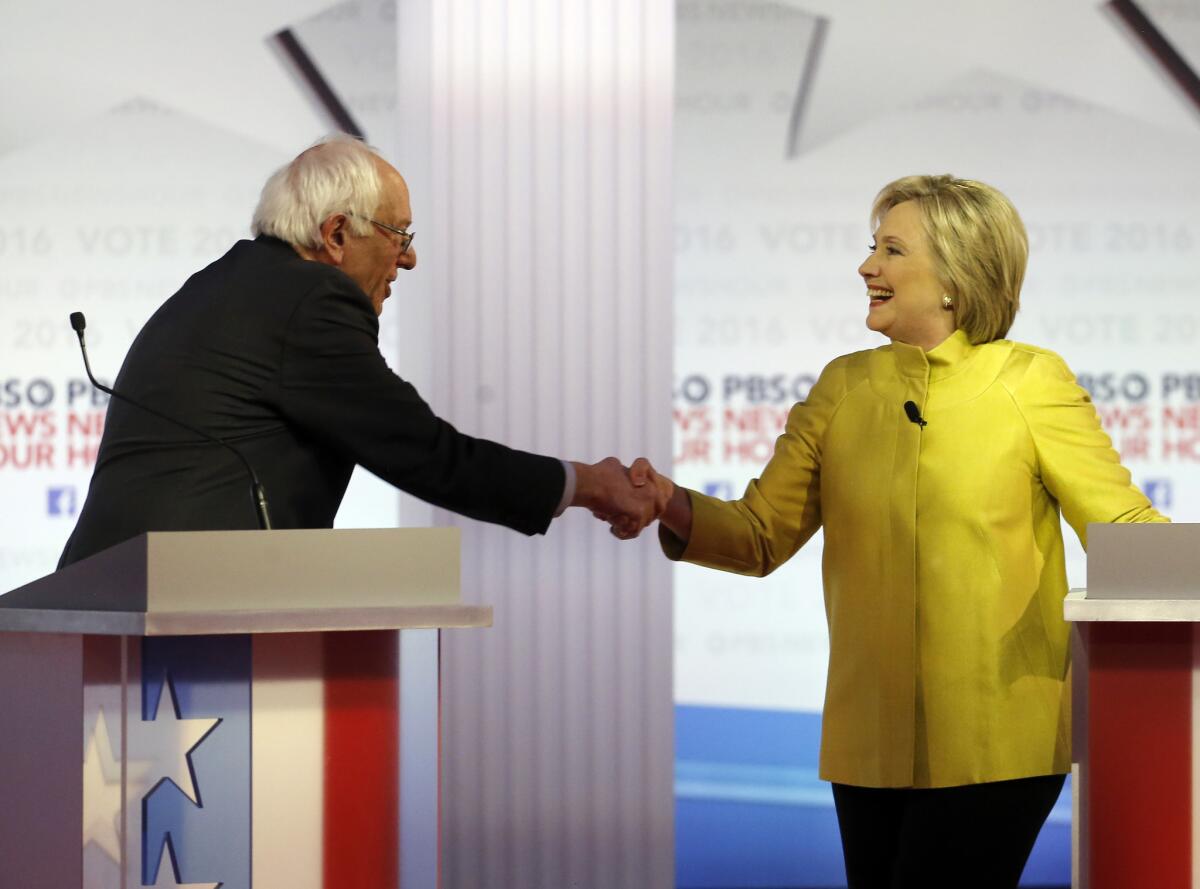
Democratic presidential candidates Bernie Sanders and Hillary Clinton shake hands after a debate at the University of Wisconsin-Milwaukee on Thursday.
- Share via
Reporting from Milwaukee — Hillary Clinton substantially adjusted her approach in Thursday’s presidential debate here, a reaction to her landslide loss in New Hampshire earlier this week.
She went out of her way to underscore the areas in which she and challenger Bernie Sanders agree. She abandoned, most of the time, the fierce criticism of Sanders’ proposals that she has delivered in previous debates.
When she did disagree with Sanders, she protected herself with a shield — President Obama, whose name she invoked 21 times in the two-hour debate.
Clinton’s biggest political need is to somehow break the attachment between Sanders and young voters, who have flocked to his events by the thousands and provided a surge of support for him in Iowa and New Hampshire.
Exit polls taken Tuesday showed young and liberal Sanders supporters — many of them women — to be extremely antagonistic toward Clinton, particularly in areas of trustworthiness and caring. She needs those voters desperately, and would need them even more in a general election if she wins the nomination, so she cannot risk alienating them further with sustained attacks on Sanders.
Obama serves as the best character witness Clinton has; he is the most prominent politician in those young voters’ lives. He is the one they were attached to before Sanders came along.
Clinton’s approach set up a stylistic difference between the candidates that has political consequence. The Vermont senator repeatedly grew florid and loud, even angry, while making his pitch, behaviors that echo and enhance his calls for revolution.
The former secretary of State is in the position of having to constantly calibrate whether she is coming across as too angry, the equivalent of the concerns Obama had about sounding like an angry black man. The absence of visible passion, particularly notable on Thursday, reinforces Clinton’s incremental approach in a year when many Democratic voters are looking for someone more vivid and passionate.
See more of our top stories on Facebook >>
Clinton’s repeated citing of Obama had a practical effect: It was evidence of her loyalty to the nation’s first African American president at a time when the campaign is moving into states with large minority populations, including Nevada, with its strong percentage of Latino voters, and South Carolina, where African Americans make up more than half of Democratic voters.
Indeed, Clinton’s most heated moment came at the end of the debate as she accused Sanders of being too critical of Obama.
“Today, Sen. Sanders said that President Obama failed the presidential leadership test,” she said. “And this is not the first time that he has criticized President Obama. In the past he has called him weak. He has called him a disappointment. He wrote a forward for a book that basically argued voters should have buyers’ remorse when it comes to President Obama’s leadership and legacy.
“I don’t think he gets the credit he deserves for being a president,” she said.
Sanders grew visibly upset. “Madam Secretary, that is a low blow,” he said, adding that he had supported Obama.
“But you know what? Last I heard we lived in a democratic society,” he said. “Last I heard, a United States senator had the right to disagree with the president, including a president who has done such an extraordinary job.”
SIGN UP for the free Essential Politics newsletter >>
For both candidates, the demands ahead were uppermost in mind. In his opening remarks, Sanders quickly turned to the subject of youth incarceration, which is of particular concern to African Americans and Latinos.
“The American people are looking around and they see a broken criminal justice system,” Sanders said. “They see more people in jail in the United States of America than any other country on Earth.”
Clinton went out of her way in her opening remarks to nod to young people, regretting that “there aren’t enough good-paying jobs” for them.
The two Democrats agreed — as Clinton regularly pointed out — on subjects like criminal justice, protecting Social Security and their joint support for immigration reform that would provide citizenship rights to most of the 11 million people in the country illegally. Both also criticized Republican presidential candidate Donald Trump for his criticisms of Mexican and Muslim immigrants.
Sanders reiterated his often-stated opposition to Clinton’s vote more than a decade ago that gave President George W. Bush approval for the war in Iraq.
To that, Clinton came up with a firmer response than she has in the past: “I do not believe a vote in 2002 is a plan to defeat ISIS in 2016,” she said. “It’s very important we focus on the threats we face today.”
Obama, like Sanders, opposed that war, so the president served as Sanders’ back-up on that point. But most of the time he was Clinton’s.
She emphasized her intention to tinker with the president’s healthcare plan, to increase insurance coverage — but not, as Sanders would, to attempt to pass a single-payer, Medicare-like program for all Americans.
She pushed back against Sanders’ accusations that she was part of a corrupt campaign finance system because she has received large donations from Wall Street.
“I debated then Sen. Obama numerous times on stages like this, and he was the recipient of the largest number of Wall Street donations of anybody running on the Democratic side ever,” she said. “Now, when it mattered, he stood up and took on Wall Street... So, let’s not in any way imply here that either President Obama or myself would in any way not take on any vested interest, whether it’s Wall Street, or drug companies, or insurance companies, or frankly, the gun lobby.”
Sanders bridled in response: “Let’s not insult the intelligence of the American people.”
Sanders’ call for upending the campaign finance system is part of his appeal to young voters. By winning young men and young women so overwhelmingly, he has cut into Clinton’s hope that women of all ages would be the backbone of her support.
The problem Clinton has in getting young women back, beyond their belief in Sanders, is that many of them recoil from any suggestion that they vote for Clinton because of her gender.
She alluded to that when asked about comments by her supporters, including former Secretary of State Madeleine Albright, that women would be disloyal if they voted for Sanders.
“I have said many times, you know, I’m not asking people to support me because I’m a woman. I’m asking people to support me because I think I’m the most qualified, experienced and ready person to be the president and the commander-in-chief,” she said.
Sanders was a distinct minority on stage Thursday, standing as he was with three women — Clinton and moderators Gwen Ifill and Judy Woodruff of PBS. He was asked whether he worried about potentially thwarting Clinton’s attempt to make history by becoming the first woman president. He displayed a certain panache that drew laughter and applause from the audience.
“Well, you know, I think, from a historical point of view, somebody with my background, somebody with my views, somebody who has spent his entire life taking on the big money interests, I think a Sanders victory would be of some historical accomplishment, as well,” he said.
For political news and analysis, follow me on Twitter:@cathleendecker. For more on politics, go to latimes.com/decker.
ALSO
Hillary Clinton mentioned Obama 21 times in her debate against Bernie Sanders
President Obama: ‘It’s not like I’ve changed’ since entering politics
Analysis: The anatomy of a Trump speech: A rollicking festival of grievance
More to Read
Get the L.A. Times Politics newsletter
Deeply reported insights into legislation, politics and policy from Sacramento, Washington and beyond. In your inbox three times per week.
You may occasionally receive promotional content from the Los Angeles Times.
